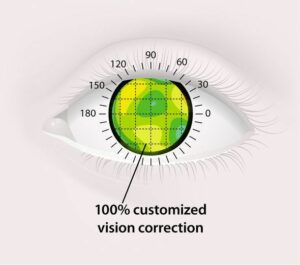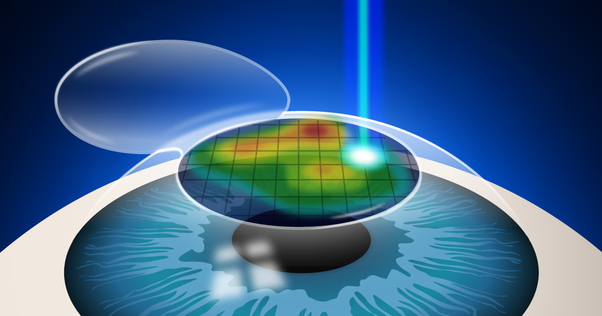If you are one of the millions of people who suffer from vision problems, there is a good chance that you have considered eye surgery. Eye surgery can be a great way to improve your vision and get rid of the glasses or contacts that you have been relying on for years. However, not all eye surgeries are created equal. In this blog post, we will discuss Contoura surgery: the new, efficient eye surgery that is quickly gaining popularity among patients all over the world.
Contents
- 1 What Is Contoura Vision?
- 2 What Does Contoura Vision Help With?
- 3 Different Types of Contoura Surgery
- 4 The procedure of Contoura Surgery
- 5 Is Contoura Surgery Effective?
- 6 Benefits of Contoura Surgery
- 7 Side-Effects of Contoura Surgery
- 8 Alternatives To Contoura Surgery
- 9 After-Care of Contoura Surgery
- 10 Conclusion
What Is Contoura Vision?
 Concours vision is a new type of eye surgery that is much more efficient than traditional methods. The surgery itself is very short, taking only about 15 minutes per eye.
Concours vision is a new type of eye surgery that is much more efficient than traditional methods. The surgery itself is very short, taking only about 15 minutes per eye.
During the surgery, the doctor will make small incisions in the cornea and then use a laser to reshape it. This will correct any refractive errors that you may have, such as nearsightedness or farsightedness.
One of the great things about contour surgery is that it can be done in one day. You won’t have to stay overnight in the hospital like you would with other types of surgeries.
Another advantage is that there is no need for stitches since the incisions are so small. You will also experience less discomfort since the surgery is so quick.
If you are considering eye surgery, contour vision is worth looking into. It is a new, efficient way to improve your vision with minimal recovery time. Schedule a consultation with your doctor to see if you are a good candidate for the procedure.
What Does Contoura Vision Help With?

Conventional LASIK surgery corrects vision by changing the shape of your cornea, which is the clear front surface of your eye. However, this approach doesn’t always produce optimal results. That’s where Contoura Vision comes in.
Contoura Vision is a new type of laser eye surgery that uses topography-guided technology to map the unique curvature of your eyes. This allows your surgeon to create a more customized treatment plan for you, which can result in better vision correction and fewer side effects.
These are some of the ailments that contour surgery can help with:
Nearsightedness
Nearsightedness, or myopia, is a common vision problem that affects millions of people around the world. If you’re nearsighted, it means that distant objects appear blurry to you while close objects are clear. With Contoura Vision, your surgeon can correct your vision so that you can see clearly at all distances.
Farsightedness
Farsightedness, or hyperopia, is another common vision problem. If you’re farsighted, it means that close objects appear blurry to you while distant objects are clear. Contoura Vision can also correct farsightedness so that you have clear vision at all distances. There may be many causes of farsightedness, but the most common is due to the eyeball being too short.
Astigmatism
Astigmatism is a vision problem that occurs when your cornea (the clear front surface of your eye) or your lens (the part of your eye that helps focus light) isn’t curved evenly. This can cause blurry vision at all distances. With Contoura Vision, your surgeon can correct the uneven curvature of your cornea or lens so that you have a clear vision
Dry Eye Syndrome
Dry eye syndrome is a condition in which you don’t have enough tears to lubricate and protect your eyes. This can lead to symptoms like burning, itching, redness, and blurry vision. Contoura Vision can help to improve your dry eye symptoms by increasing the number of tears you produce.
If you’re interested in learning more about Contoura Vision, or if you’re considering laser eye surgery, be sure to consult with a qualified surgeon who has experience performing this procedure.
Different Types of Contoura Surgery
There are many different types of contour surgery. The most common type is LASIK, which is a laser-based surgery. Other types include PRK, AK, and LTK.
LASIK Surgery
One type of surgery is LASIK, which uses a laser to correct your vision. The surgeon will first create a small flap in the cornea. Then, they will use the laser to reshape the cornea and improve your vision. After the surgery, you will need to wear a protective shield over your eye for a few days. In this therapy, two different types of lasers can be used.
The first type is called an excimer laser. This laser uses ultraviolet light to break down molecules in the cornea so that it can be reshaped. The second type of laser is called a femtosecond laser. This laser creates the flap in the cornea that’s necessary for the surgery.
PRK Surgery
Another type of surgery is PRK, which stands for photorefractive keratectomy. In this surgery, the surgeon will remove the surface layer of your cornea (the epithelium). Then, they will use a laser to reshape your cornea and improve your vision. After the surgery, you will need to wear a bandage contact lens for a few days to help protect your eye.
AK Surgery
AK, or astigmatic keratotomy, is a type of surgery that’s used to treat astigmatism. In this surgery, the surgeon will make incisions in the cornea to change its shape. This will improve your vision by allowing light to be focused more evenly on the retina. After the surgery, you will need to wear a protective shield over your eye for a few days.
LTK Surgery
LTK, or limbal relaxing incisions, is another type of surgery that’s used to treat astigmatism. In this surgery, the surgeon will make incisions in the peripheral part of the cornea. This will improve your vision by allowing light to be focused more evenly on the retina. After the surgery, you will need to wear a protective shield over your eye for a few days.
PRK Surgery
Another type of contour surgery is PRK or photorefractive keratectomy. This surgery is similar to LASIK, but instead of creating a flap in the cornea, the surgeon will remove the outer layer of the cornea (the epithelium). Then, they will use the laser to reshape the underlying tissue and improve your vision. After PRK surgery, you will need to wear a bandage contact lens for a few days to help protect your eye.
The procedure of Contoura Surgery
The procedure of Contoura surgery is very simple. It is an outpatient procedure, which means that you can go home the same day. The surgery usually takes less than 30 minutes. You will be given local anesthesia to numb the area around your eyes. Then, the surgeon will make small incisions in your eye and insert a tiny camera called a microkeratome. This camera will remove a thin layer of your cornea. After that, the surgeon will use a laser to reshape your cornea according to the map of your eye that was created before the surgery. Finally, they will put a contact lens on your eye to protect it while it heals.
In this procedure, the surgeon will first create a hinged flap in your cornea. They will then use a laser to remove some tissue from your cornea. After that, they will place the flap back and seal it with a bandage contact lens.
When the surgery is done, you will be given eye drops to help your eyes heal. You will need to wear a protective shield over your eye for a few days. Your vision will be blurry at first, but it should start to improve within a few days.
In the procedure also, two types of lasers can be used. One is an excimer laser and the other is a femtosecond laser.
The excimer laser is used to remove tissue from your cornea. This type of laser is very precise and can remove very thin layers of tissue. The femtosecond laser is used to create the hinged flap in your cornea. This type of laser is less precise than the excimer laser, but it is still very safe.
Is Contoura Surgery Effective?

The effectiveness of Contoura surgery has been clinically proven. In a study done by the American Society of Cataract and Refractive Surgery, it was shown that Contoura surgery outperforms traditional LASIK surgery in terms of both safety and efficacy.
Not only is Contoura surgery effective, but it is also efficient. The entire surgery can be completed in as little as 15 minutes, which is much shorter than traditional LASIK surgeries.
Some reports also suggest that Contoura surgery can help improve your night vision. This is because the Contoura laser can target and correct more irregularities in the eye than traditional LASIK lasers. There may be people who experience some dryness and irritation after the surgery, but this is usually temporary and can be treated with eye drops.
If you are considering getting LASIK surgery, you should ask your doctor about Contoura surgery. It may just be the best option for you.
Benefits of Contoura Surgery
There are many benefits of Contoura surgery. One of the most significant benefits is that it can help correct your vision so that you no longer need to wear glasses or contact lenses. Contoura surgery can also make your eyes look more aesthetically pleasing, and it can help improve your overall eye health.
Another benefit of Contoura surgery is that it is much less invasive than other types of eye surgery, such as LASIK. This means that there is a shorter recovery time and less risk of complications. Contoura surgery is also much more precise than other types of eye surgery, which means that your vision will be corrected more accurately.
Another benefit of Contoura surgery is that it can be done in just one day. This means that you will not have to take time off work or school for the surgery, and you can resume your normal activities the next day. Sometimes there may be some discomfort for a few days but it is very manageable.
If you are considering Contoura surgery, be sure to speak to your doctor about all of the benefits and risks. Contoura surgery is a safe and effective way to improve your vision, and it can have a significant impact on your quality of life.
Side-Effects of Contoura Surgery

Certain side effects are associated with contour surgery. These side-effects can include:
- dry eyes
- increased risk of infection
- inflammation
- corneal abrasion
- light sensitivity
- implant rejection
These side effects are usually temporary and will resolve on their own within a few weeks. However, if you experience any persistent problems, it is important to contact your doctor immediately. Overall, contour surgery is a safe and effective way to improve your vision. It is important to discuss all the risks and benefits of the surgery with your doctor before making a decision.
Alternatives To Contoura Surgery
There are many alternatives to Contoura surgery. Some of these include:
Traditional Lenses
One of the most common alternatives to Contoura surgery is traditional lenses. Traditional lenses are made of a material called polymethyl methacrylate (PMMA). PMMA is a type of plastic that has been used in eye surgery for over 50 years.
While traditional lenses are an effective alternative to Contoura surgery, they have some drawbacks. One drawback is that traditional lenses can cause glare and halos around lights. Another drawback is that traditional lenses can make it difficult to see at night.
Rigid Gas-Permeable Lenses
Rigid gas-permeable (GP) lenses are another alternative to Contoura surgery. GP lenses are made of a material called silicone acrylate. Silicone acrylate is a type of plastic that is more permeable to oxygen than PMMA.
GP lenses have many benefits over traditional lenses. One benefit is that GP lenses do not cause glare or halos around lights. Another benefit is that GP lenses allow more oxygen to reach the eye, which can help to prevent dry eyes.
However, GP lenses have some drawbacks. One drawback is that GP lenses can be uncomfortable to wear at first. Another drawback is that GP lenses can make it difficult to see in low light conditions.
After-Care of Contoura Surgery
Taking good care of your eyes after Contoura surgery is very important. Here are a few things you should do:
-Apply ice packs to your eyes for the first 24 hours after surgery.
-Sleep with your head elevated for the first few nights.
-Do not rub or touch your eyes for at least four weeks.
-Wear sunglasses when outdoors to protect your eyes from the sun.
These are some important things to remember when taking care of your eyes after Contoura surgery. By following these simple guidelines, you can help ensure a successful outcome and a speedy recovery.
Conclusion
Contoura surgery is a new, efficient eye surgery that corrects your vision. It is less invasive than LASIK and has a shorter recovery time. This surgery is ideal for people who want to improve their vision without having to wear glasses or contact lenses. If you are considering Contoura surgery, be sure to consult with an experienced eye surgeon to see if it is the right procedure for you.
The surgery itself takes less than an hour, and patients can usually return to their normal activities within a few days. There are no stitches or bandages required, and there is very little risk of infection. Contoura surgery is safe and effective, and it can help you achieve the clear vision you have always wanted. There are many other benefits that we have not discovered yet, so if you are considering this surgery, be sure to ask your eye surgeon about all the potential benefits.
For more information, please contact Eye Mantra. They also offer the most advanced Lasik options including Retina Surgery, PRK, Femto Lasik, SMILE surgery, Standard Lasik, and Contoura vision. If you have any questions on LASIK surgery, LASIK surgery cost, and LASIK procedure, call us at +91-9711116605 or email at [email protected]. We provide effective cataract surgery in Delhi and Lasik Surgery in Delhi.


